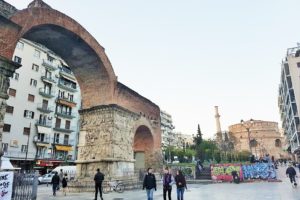Reading scripture has deadly implications.
“For the word of God is alive and active. Sharper than any double-edged sword, it penetrates even to dividing soul and spirit, joints and marrow; it judges the thoughts and attitudes of the heart. Nothing in all creation is hidden from God’s sight. Everything is uncovered and laid bare before the eyes of him to whom we must give account.” Hebrews 4:12-13
When we bear witness to truth and justice, we are recontextualized into a paradigm where compassion reveals the equal humanity of every human being while also confronting our own inhumanity; or, in other words, love happens. In this love, the truth and justice of the scriptures stand opposed to the falsehood and injustice of our own lives and of this world. When we receive its message in faith and by the power of the Holy Spirit, we find ourselves in the middle of the context of the eternal covenant–God’s eternal declaration that he will be God for us even when we are set against him–and God thus makes us able to understand the “deep things of God… For who knows a person’s thoughts except their own spirit within them? In the same way, no one knows the thoughts of God except the Spirit of God. What we have received is not the spirit of the world, but the Spirit who is from God, so that we may understand what God has freely given us” (1 Cor. 2:10-12). Our reception of the scriptures is in the context of our reception of the Spirit himself. Even that dynamic is in the context of Jesus’ reception of us. This is nothing more than what’s conveyed in Jesus’ prayer in John 17, “Father, I want those you have given me to be with me where I am, and to see my glory, the glory you have given me because you loved me before the creation of the world.”
Reading scripture involves taking what’s been given from above and ingesting it down below. I can’t help but be drawn to Jesus’ words in John’s gospel, as he said, “Your ancestors ate the manna in the wilderness, yet they died. But here is the bread that comes down from heaven, which anyone may eat and not die. I am the living bread that came down from heaven.” (John 6:49-51). Jesus’ statement is so radical because he does not simply claim that he will nourish their spirits. Instead, he claims that any other ‘manna’ will produce death. To live, we must have faith and therefore ingest heavenly bread; but this means declaring with Jesus that no other bread gives life. But this life is not a revival or a renewal; it comes through death and resurrection.
Jesus and the gospel writers recognized that spiritual transformation cannot come without death and resurrection. Jesus’ call for us to continually die in order to follow him (Matt. 16:24-26) and Paul’s continual call for churches to put the flesh and its works to death show us this truth. The cross and the empty tomb define this death and resurrection. When we put to death the deeds of the body, we renew our baptismal experience that we “were therefore buried with him through baptism into death in order that, just as Christ was raised from the dead through the glory of the Father, we too may live a new life” (Rom. 6:4).
If we read the scripture and refuse to die to ourselves, we deny the cross. If we leave from reading and refuse to live our new life in him, we deny the resurrection. So let us affirm both when we read the scriptures and die together so that we might live.





Leave a Reply
Your email is safe with us.